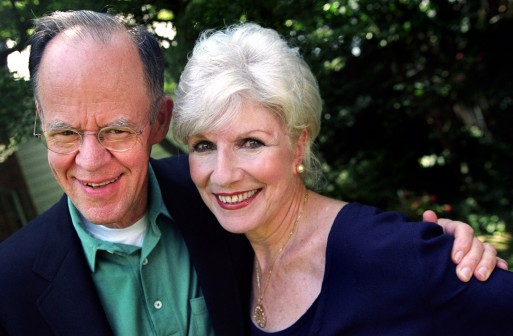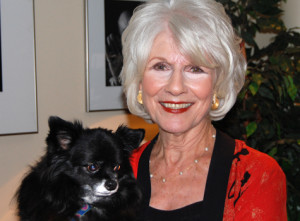For over three decades, Diane Rehm has entertained millions of listeners from her seat in front of the microphone at public radio station WAMU in Washington D.C. Now 79, Rehm has interviewed countless political and cultural figures, including Barack Obama, Bill and Hillary Clinton, Fred Rogers and Madeleine Albright. She is also the author of a candid 2002 autobiography “Finding My Voice,” and co-author of “Toward Commitment: A Dialogue about Marriage,” which she wrote with her husband, John Rehm.
Now Rehm has written another book about her life, this one from a very different perspective — that of a widow who was forced to watch her husband of 54 years die a slow and painful death because a more compassionate option was not available to him. On March 3, 2016, the talk show host spoke with Jeffrey Brown of PBS about the experience and about her latest book “On My Own.”
John Rehm was diagnosed with Parkinson’s disease in 2005. By 2012, he was no longer able to care for himself and decided to enter the assisted living facility where he eventually died on June 23, 2014. In the interview, Diane talks frankly to Brown about the guilt she has carried with her about that decision, especially in the wake of John’s death.
“How could I not feel guilt” she says. “I think every spouse who sees another go into an assisted living facility must experience some of that,” she adds. “If I had stayed home, if I had given up my work, if I had cared for him here at home, perhaps he would have lived at least a few months longer. I’m not sure that is the case. But it was the guilt I felt. We take vows when we marry, for better, for worse, in sickness, in health.”
Diane also speaks with heartrending candor about John’s decision to let go of life and the horror of realizing that the option of a physician-assisted death was not available to him. When he told her he was ready to die, she explains, she asked him many times, “Sweetheart, are you sure?” His answer, she says, was “Absolutely. I can no longer use my hands. I cannot walk. I cannot feed myself. I cannot do anything for myself. I am ready to die.”

John and Diane Rehm
(Credit: washingtonpost.com)
Sadly, wanting to die and being able to die quickly and painlessly are not the same thing. Only a handful of states (California, Oregon, Vermont, Washington and Montana) currently allow physicians to help terminally ill patients choose the time and circumstances of their death. So John took the only avenue available to him: He refused all food, fluids and medication. It took him 10 days to die.
Since John’s death, Diane has become an outspoken proponent of an individual’s right to choose when and how to exit this life. As she explains to Brown, “I am arguing not that everyone should feel as I do and ask for death when the time comes. I understand those who would prefer to give and receive palliative care…But do not let the law prevent me from making my choice about my own life.”
Diane plans to retire after the November 2016 elections, at which time she will be 80 years old. At that point, she says, she’ll be free to advocate for legislation to change the existing laws in the District of Columbia and, perhaps, nationwide. Until then, she is simply advocating for herself and her own right to live and die on her own terms.

Diane and Maxie
(Credit: stardem.com)
Meanwhile, Rehm is adjusting to life without her life partner of nearly six decades. Sitting with her beloved dog, Maxie, in her lap, she muses a bit about that, too and about the sometimes turbulent life she and John shared. “…I believe that no marriage is perfect,” she says. “And yet so many of us go into marriage or partnership or relationship believing that all is going to be sunny, all is going to be wonderful. I wish, Jeff, I had been more mature.”
And when Brown asks, “So, you’re now, as the book says, on your own…for the first time in many many years,” she answers simply, “Except for Maxie, who is my constant companion…I talk to Maxie. I talk to John, and John talks back to me.”
After 54 years, I’m sure he does.

 The Tragic Death of John Rehm
The Tragic Death of John Rehm


 How Dare You Die Now!
How Dare You Die Now!

 “Help Me, Helen”
“Help Me, Helen”














